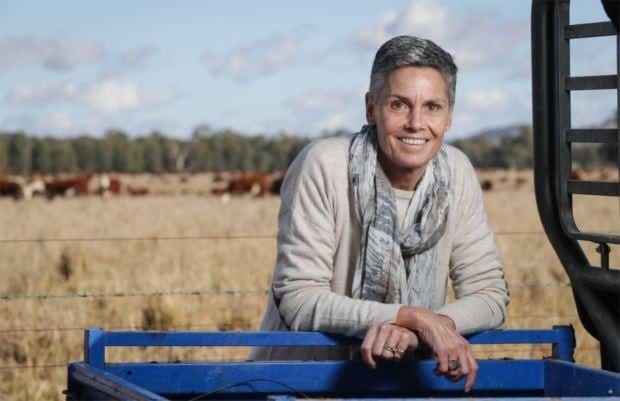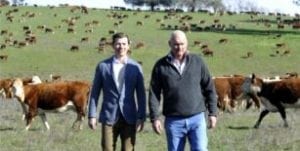
21 Jun CLIENT SPOTLIGHT: ANNA & MICHAEL COUGHLIN
Animals and environment thrive in holistic farm cycle at Tarabah Pastoral
By John Chanter (published June 14 2018)
Anna Coughlan says their cost of production is below 30c/kg under holistic farm management. Picture: JAMES WILTSHIRE
When Anna and Michael Coughlan adopted holistic farming practices 20 years ago the economic and environmental benefits were clear from day one.
The Coughlans run Tarabah Pastoral, a self-replacing beef operation at two properties: Michael’s family property “Tarabah” at Morundah and their home farm “Mt Narra Narra Station” at Holbrook.
Each property is divided into 180 permanent paddocks averaging between 12 and 15 hectares and stock are moved from paddock to paddock daily.
Because cattle are not grazing the same ground for more than 24 hours, animal health issues are virtually non-existent, they don’t drench or vaccinate and have not needed herbicide.
“We’ve got no control over what the market price is, we’ve got no control over the weather, the only thing we can control as producers was how much it costs us to produce that product,” Mrs Coughlan said.
“Input costs are negligible. Our biggest cost is land rates … our cost of production is below 30 cents a kilo.”
Input costs are negligible. Our biggest cost is land rates … our cost of production is below 30 cents a kilo
Anna Coughlan, Tarabah Pastoral
Mrs Coughlan said they don’t even own a tractor and the low operating costs puts them in a strong position to absorb downturns, such as drought.
“We had quite a bit of interest during the 2000 drought, people were saying ‘Roundup’s gone up, diesel’s gone up and fertiliser’s gone up maybe there’s some merit in what you do because you don’t use any of those inputs’, she said.
“But the minute it rains and things turn, they’re back to their old ways.”
They took up holistic management – promoted by African leader in the field Allan Savory and Australian advocate Bruce Ward – in 1998, as the Millennium drought was building.
“Our educator at the time Bruce Ward, who has since died, said a drought is less rain, it’s not no rain, so if you’re out of a paddock for six months something’s happened,” Mrs Coughlan said.
“Because you’ve allowed that pasture time to recover there is something in the paddock, there’s not nothing.
“The paddocks that have stock grazing in there all the time, every time there is a green shoot it gets eaten off.
“If you haven’t got animals grazing a paddock continuously it’s allowed time to recover, so by the time they get back into that paddock there’s something there.”
The Coughlans are participating in a nation-wide program Land to Market Australia, which will for the first time use scientific rigour to show improvements to biodiversity, soil health, and ecosystem function.
“A lot of people are saying ‘where’s the science?’ which there hasn’t been a lot of that done. That’s what this Land to Market is about,” Mrs Coughlan said.
“It is doing quantitative measures and is going to be peer reviewed.
“But we’ve done soil tests and things over the years and our phosphorus levels have gone up, our carbon levels have gone up, our organic matter has gone up, our pH has improved. All that sort of stuff.
“And that’s without any fertiliser or any treatments whatsoever.”
The Land to Market Australia program – backed by the Federal government’s Farming Together program – has been developed and is being managed by a group of 31 farmers who practice holistic land management.
Between them they manage farms totalling 47,000 hectares.
Altogether, they manage nearly 20,000 head of livestock (mainly cattle, also sheep and pigs) and each year produce 3.7m eggs and 162 tonnes of horticultural products.
Mrs Coughlan says under the stock rotation program, they can make accurate daily feed assessments looking half a year ahead.
“Literally, we’ve got 180 days feed in front of us,” she says.
“We’d do a feed assessment now and say if it doesn’t rain or nothing happens for the next six months we’ve got that much feed in front of us.
“You’ve always got quite a lot of leeway to make that early call.
“You can say ‘well, I’ve done my feed assessment, I know I haven’t got enough feed on hand, I’ve either got to sell some stock now before everyone else is selling stock, or I get feed in now.”
Since switching to holistic management, they have not needed to buy in any extra stock feed, or cut into the breeding herd to get through droughts.
“We’ve got a lot of things we can do before we get to that point,” she said.
“We automatically sell any dry cattle, anything that’s not in calf goes, and obviously our steers, so there’s a lot of cattle we can get rid of before we start selling our breeding herd.”




Sorry, the comment form is closed at this time.